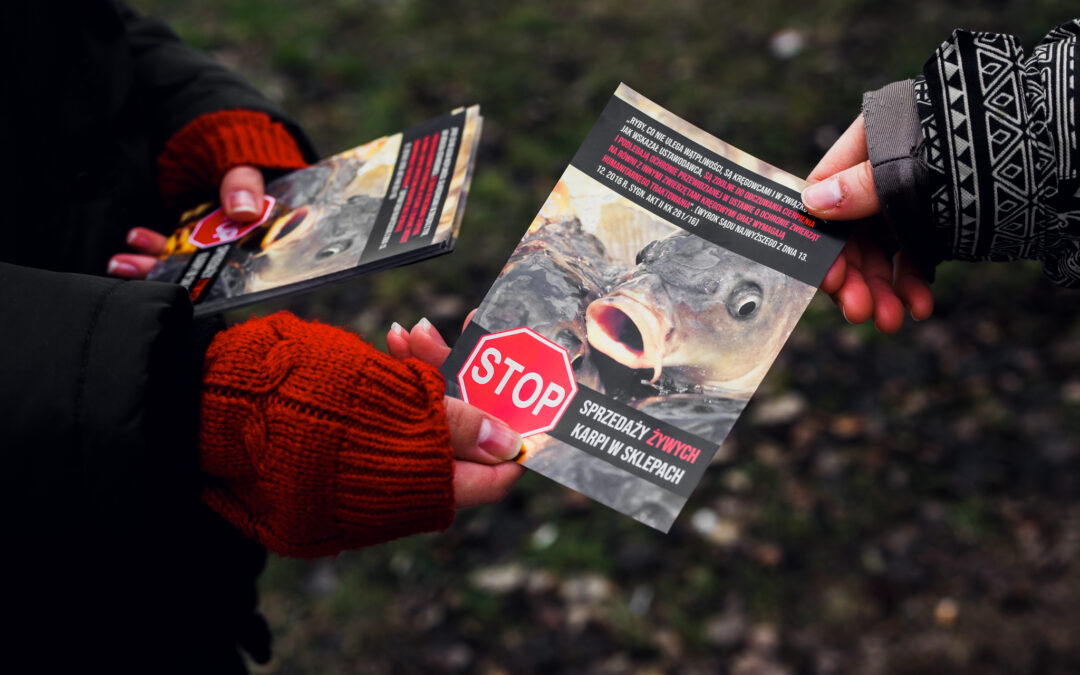Animal rights activists have welcomed a “historic moment” after three supermarket employees were found guilty of cruelty towards carp. In Poland, the fish are traditionally sold live in December before being killed and eaten at Christmas.
A Warsaw court sentenced two employees of the Polish branch of E.Leclerc, a French supermarket chain, to ten months’ imprisonment suspended for two years. The head of the sales department at the store in question received a one-year suspended sentence. The three men have the right to appeal.
The long-running case, which dates back to 2010, concerned fish kept in crates without water and then put into plastic bags, in most cases leading to suffocation. It was brought by representatives of the Noga w Łapę foundation, an animal rights group.
A tak się sprzedaje karpia w Carrefour we Wrocławiu.
Żywego, w folii, aby sobie dogorywał na taśmie przy kasie.
Pani kasjerka rozbawiona: „Ale on skacze! Ale wariat! Czy aby nie ucieknie?”Hi hi hi #karp #dodupyztakimiswietami pic.twitter.com/87yuplHCG8
— AleksanderTwardowski (@OloCzarny) December 4, 2018
Their notification to prosecutors was initially dismissed on two occasions. When the foundation filed an indictment against the three employees, courts twice found them not guilty of cruelty to animals.
The foundation’s lawyers then appealed to the Supreme Court, which in 2016 overruled the verdict of the appeal court and ordered a renewed adjudication of the case.
In the new court ruling, the judge found that the accused “must have realised that their behaviour caused the fish to suffer” by being “kept without water, packed into plastic bags and thrown into containers”, according to Karolina Kuszlewicz, the foundation’s legal representative, quoted by Gazeta Wyborcza.
Kuszlewicz said that the suspended sentences were appropriate. The foundation had wanted only a “symbolic” punishment rather than a severe one.
Activists from the foundation confirmed that their aim was not to seek punishment, but rather for “a judicial authority to afford carp the right to humanitarian treatment, without pain and suffering,” reports Gazeta Wyborcza.
Kuszlewicz added that the judge “emphasised that the case was groundbreaking” and that the sentence was intended to educate “not only the accused but society in general, including large companies that still allow carp to suffer”.
Carp in the bathtub, hay under the tablecloth and plenty of pierogi – the Independent looks at how the Poles do Christmas dinner https://t.co/X9k6Bc8VhE
— Notes from Poland 🇵🇱 (@notesfrompoland) December 23, 2017
Carp in Poland are often purchased live in the run-up to Christmas before being slaughtered fresh to eat for supper on Christmas Eve. Some families keep the animals in their bathtubs beforehand.
In recent years, however, campaigns against the practice have led many shops to stop selling fish live. Opinion polls also suggest that Poles’ attitude to the practice has been changing too.
Only around a quarter, 26.6%, of Poles say they plan to buy live carp to eat this Christmas, according to a survey carried out by IBRiS for Compassion Polska, which says its objective is to ban the practice.
Last year, however, a poll by ABR SESTA i SYNO Polska found that 46% said they would be buying live carp. Some 79% of those planning to do so cited “tradition” as their reason, reports Interia.
@lolumOKUR so I'm polish and we have a tradition that you keep a carp for Christmas. So you keep it in the bathtub and feed it sugar and it's hard to shower for a few days. pic.twitter.com/306k5z5txc
— Jerzy Dydecki (@jerzyd) May 6, 2020
A tradition born under communism
For many Poles, carp continues to be an indispensable part of Wigilia, the traditional Christmas Eve dinner, which traditionally comprises 12 meat-free dishes in honour of the apostles.
But while fish has been a mainstay on Polish Christmas tables for centuries, carp was more commonly a Jewish delicacy, and only gained wider popularity after the Second World War because of fish shortages.
It was promoted in 1947 with a slogan – “Carp on every Christmas Eve table” – dreamt up by communist government minister Hilary Minc, according to Onet. With many types of fish difficult to get hold of in the communist period, Minc’s vision became a reality, and the tradition of the Christmas carp was born.
🐟🐟 Dziś Dzień Ryby. W sklepach tuż przed świętami można kupić żywe karpie, które męczą się w złych warunkach – w #Onet100 przypominamy, w jaki sposób należy postępować z rybami także, jeśli są one przeznaczone do zjedzenia pic.twitter.com/pePDLZg81z
— Onet100 (@Onet_100) December 20, 2019
But the sight of shallow pools crammed with fish in Polish supermarkets in December has become less common in recent times.
A number of supermarket chains, including Biedronka and Lidl, have decided to discontinue the practice. Tesco joined them in 2019, following a campaign by Compassion Polska which resulted in over 12,000 emails from customers.
“Live carp are kept in hugely crowded conditions in pools, getting insufficient air and injuring each other,” Krzysztof Wojas, a fish welfare expert from the organisation, told Onet. “Finally, after being bought, they suffocate in plastic bags without water, before being killed by unqualified people.”
In 2016, Poland’s Supreme Court ruled that letting fish be stored or transported without water and in plastic bags constitutes illegal animal abuse. It found that the relevant law guarantees “real, and not just superficial, protection for all vertebral animals – including fish – and there is no reason to deprive carp this right”.
Żywe karpie z #Tesco #Tychy już u prokuratora https://t.co/y6lkA0tIaf pic.twitter.com/dKCB1cPBdw
— Dziennik Zachodni (@zachodni) December 14, 2016
Main image credit: Otwarte Klatki/Flickr (under CC BY 2.0)

Ben Koschalka is a translator, lecturer, and senior editor at Notes from Poland. Originally from Britain, he has lived in Kraków since 2005.




















